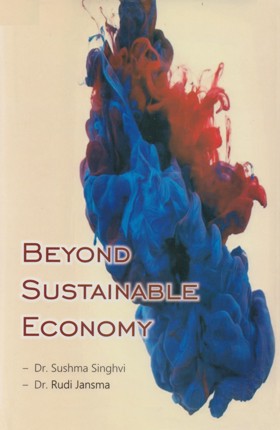Earlier we published the book named Aparigraha Vishvakosh, i.e. 'Encyclopedia of Non-grasping' in Hindi, as a counterpart of the Ahimsa Vishvakosh, 'Encyclopedia of Non-violence.[1] The present volume, Beyond Sustainable Economy can be regarded as an English suplimentary version of the Aparigraha Vishvakosh. Many Indian authors for the first work had submitted their texts in English - which were only partly translated to Hindi. The present volume contains the original English articles and a selection of the best texts translated from Hindi. However, quite a number of texts that have been written and added later and therefore cannot be found in the Hindi version have been included here.
Though Hindi is understood by a very large number of people, it leaves out the rest of the world's population - and many people may not be aware of some of the ideas that are relatively new and revolutionary to the Western mind. This may also be true for the minds of the many modern Asian and African peoples who direct their eyes towards the Western ways of life. Those who have no practical, 'life', experience with the European and North or South American ways of thinking, may have colored views and sometimes overlook the disadvantages which the Europe-based societies has brought to the world.
Therefore, in this book, we have brought together entries from a wide variety of viewpoint. In the section on Religions we have included articles about Islam, the the Hindu tradition, Christianity, Jainism, Sikhism and Jainism and Zoroastrianism. In the Philosophy section, you find entries by authors from the US, the EU and India, from Plato to Marxism, and it also includes all six great Indian schools of thought.
We have specifically inserted a separate section on Jain philosophy - in which aparigraha - non-grasping, non-hoarding, non-accumulation of wealth is a central issue.
Specialists have written articles which are readable for the general public about psychology, education, sociology, ecology and -last but not least - on economy and business ethics. At the end of the book is a section on politics and policy, containing some practical suggestion for those who live in that field of action.
We have also included a scientific section, dealing with the use of energy, and renewable and non-renewable resources from an aparigrahic point of view. This section on the Use of Energy, with the subtitle: 'How we can grasp less from the Earth, energetically'. This section is full of scientific data and the pros and cons of various forms of energy consumption worldwide, and how we can approach the connected problems from an aparigrahic and ahimsic point of view.
In the middle of the book you find a section called 'Special People' containing biographies of people from a diversity of cultures who have brought aparigraha into the practice of their own life. Their lives can be a source of inspiration for May.
The Publisher wishes to profoundly thank the editors, Dr. Sushma Singhvi - the Chief Editor of the Hindi Aparigraha Vishvakosh - and Dr. Rudi Jansma, who jointly edited the English version of this book.
D.R. Mehta
Jaipur, March 11, 2018.
 Dr. Rudi Jansma
Dr. Rudi Jansma
